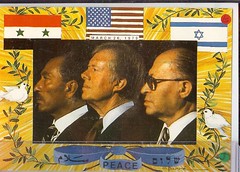Egypt and Israel plus thirty
Mar 26th, 2009 by MESH
From Harvey Sicherman
 Churchill once observed that “jaw-jaw” was better than “war-war.” This advice has not been taken very often in the Middle East. Indeed, so rare is it that the very act of “jaw-jaw” has been celebrated as a breakthrough even if not very much—except a process—results from it.
Churchill once observed that “jaw-jaw” was better than “war-war.” This advice has not been taken very often in the Middle East. Indeed, so rare is it that the very act of “jaw-jaw” has been celebrated as a breakthrough even if not very much—except a process—results from it.
March 26, however, marks the 30th anniversary of both a very successful process and an enduring agreement. The Egyptian-Israeli Treaty has survived assassination, war, and recession. This history holds important lessons as yet another American administration tries to reach for Arab-Israeli peace. The ingredients for success are easy to state: (1) two leaders who have convinced each other that they want an agreement and are capable of carrying one out; (2) an American president willing to reduce their risks in doing so and to mediate personally if necessary; and (3) reasonable expectations, rather than legal perfection, about the results.
No one would say that Egyptian-Israeli relations are the warmest. The cultural exchanges foreseen by the Treaty have never materialized. There is also plenty of diplomatic friction. But the essentials have held and, at its bare minimum, the Treaty still reflects a mutual determination to avoid war. It may sometimes look like a peace of the generals, but it is still peace.
Can this Treaty and its relative, the Israeli-Jordanian Peace (1994), be replicated with others? Israel and Syria would seem to be the best candidates if—always the “if”—the parties have really convinced each other they want a fair deal. On the Palestinian track, however, no one thinks that Abu Mazen can deliver his side of the bargain even if he wants one. And there are corrosive doubts that the risks from Iran and its surrogates can be reduced by the United States. That is where we will continue to be unless the new administration somehow curtails Tehran. And a failure on that score will have dangerous repercussions for the Egyptian-Israeli relationship as well.
 Posts+Comments
Posts+Comments Posts+Comments
Posts+Comments Posts+Comments
Posts+Comments Posts+Comments
Posts+Comments